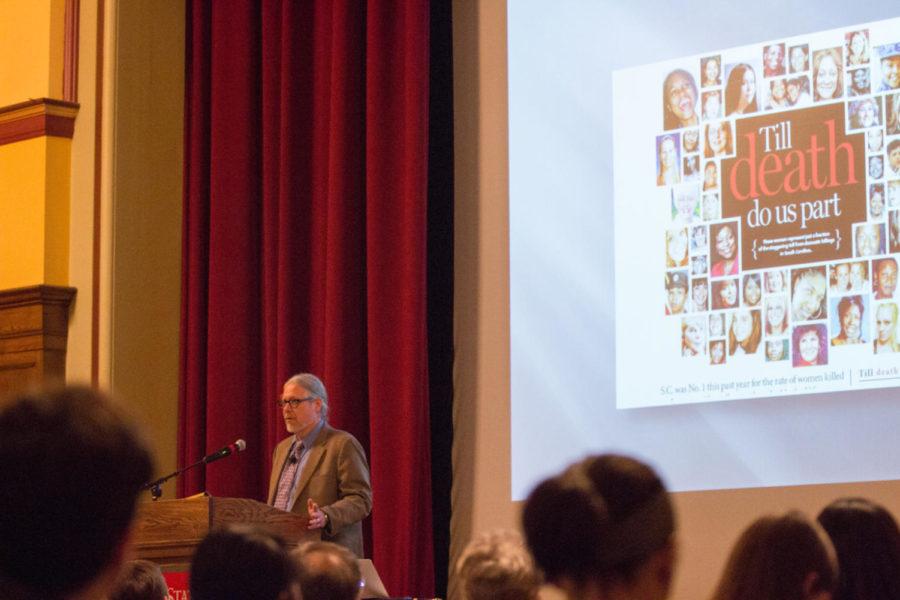Lecturer: ‘It’s an emotional thing … the power of words and the First Amendment’
Emily Blobaum/Iowa State Daily
Glenn Smith, special projects editor at the Post and Courier in Charleston, S.C. speaks to students and community members about his work in watchdog journalism April 20. Smith won a Pulitzer Prize for his series “Till Death Do Us Part.”
April 20, 2017
The First Amendment gives us the right to free speech, and that includes exposing truths. That is what special projects editor of The Post and Courier Glenn Smith has done throughout his work.
The Post and Courier, based in Charleston, South Carolina, produced “Till Death Do Us Part,” a series about domestic violence in the state.
The truth is, Smith said, that it was not easy to get people to talk about their experiences of domestic violence.
“The story had really been staring at us in the face, but no one saw it,” Smith said.
In conjunction, Smith said how those he spoke to did not hold back.
“Someone had been waiting for someone to listen to their story,” Smith said.
An experience that especially touched Smith was a story about a young woman, named Emily Ann, who had been strangled to death by her boyfriend.
Smith’s voice started to break.
The boyfriend had taken a computer cord and strangled her in his car.
The victim’s mother is now proactive in the justice of strangle cases, Smith said, and the two have worked together closely.
Despite the hard work and remaining firm throughout the reporting, Smith is still touched by the experience the domestic violence series brought him.
As he spoke, his voice choked and emotion ran through his words.
“It’s an emotional thing … the power of words and the First Amendment,” Smith said.
Smith spoke about how he used the power of the First Amendment throughout his writing. The speaker shared that we have the opportunity to express our thoughts without a blink and that “that is a gift.”
He later elaborated on more specific instances where the First Amendment truly reigns, such as exposing doctors mistreating patients and freeing slaves in Indonesia.
Smith uses his freedom of speech and the power of the First Amendment to refute fake news, uncover the truth and put a spotlight on what is indeed false news.
Not only is the First Amendment the pathway that led our history, but Smith said that it is still the future.
“The nation needs us now more than ever … [because] facts matter and accountability matters,” Smith said.
Smith addressed the topic about news sources racing against one another to get a story out first and gave his advice.
“It’s not all about being first to the party. It is getting it right,” Smith said.
He shared experiences in South Carolina that have impacted him in ways he may not have ever imagined. Smith covered cops for 30 years and reported on countless murders in addition to those involved in “Till Death Do Us Part.”
“I found myself shaking as I drove back to the office,” Smith said as he had just recorded a crime firsthand before the cops had even arrived. “I felt like I was holding a stick of dynamite.”
Smith’s value resides in his community and doing justice. That is exactly what the First Amendment allows him and every other American to do.
“What if we hadn’t dug a little deeper? We would have let our community and the First Amendment down,” Smith said.
Smith spoke to the journalists of all skill levels in the Great Hall, old and new.
“For those just starting out in journalism, I ask you to appreciate the gift you have been given. You will get to meet new people, share new experiences and learn something new each and every day,” Smith said. “… Where else can you get paid to learn and have cool experiences and see things in a position that nobody else will be able to see and walk up to the leaders making decisions and ask them why they’re doing that?
“To those who have been in the business, I urge you to reach back and hold that sense of freedom and adventure.”







